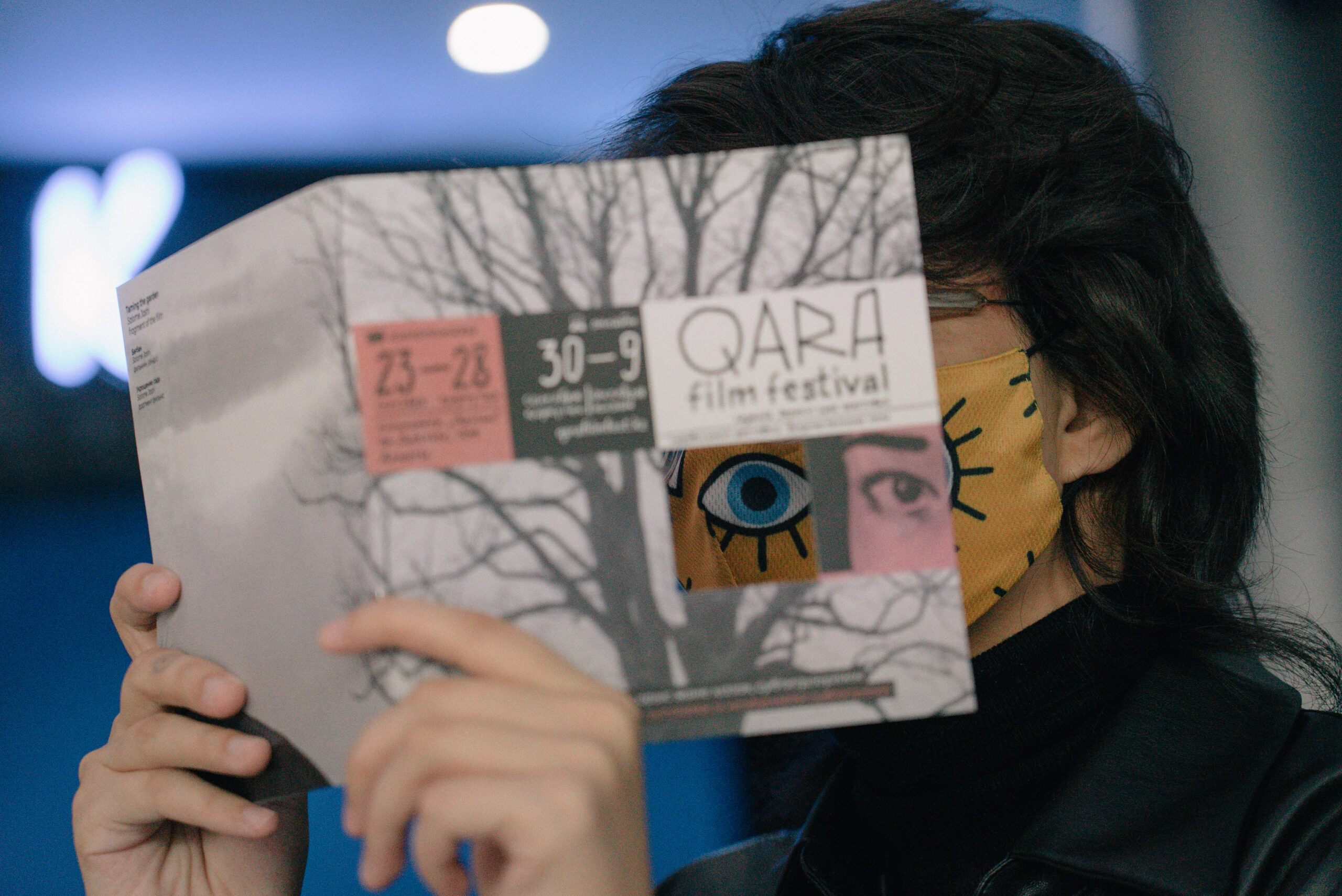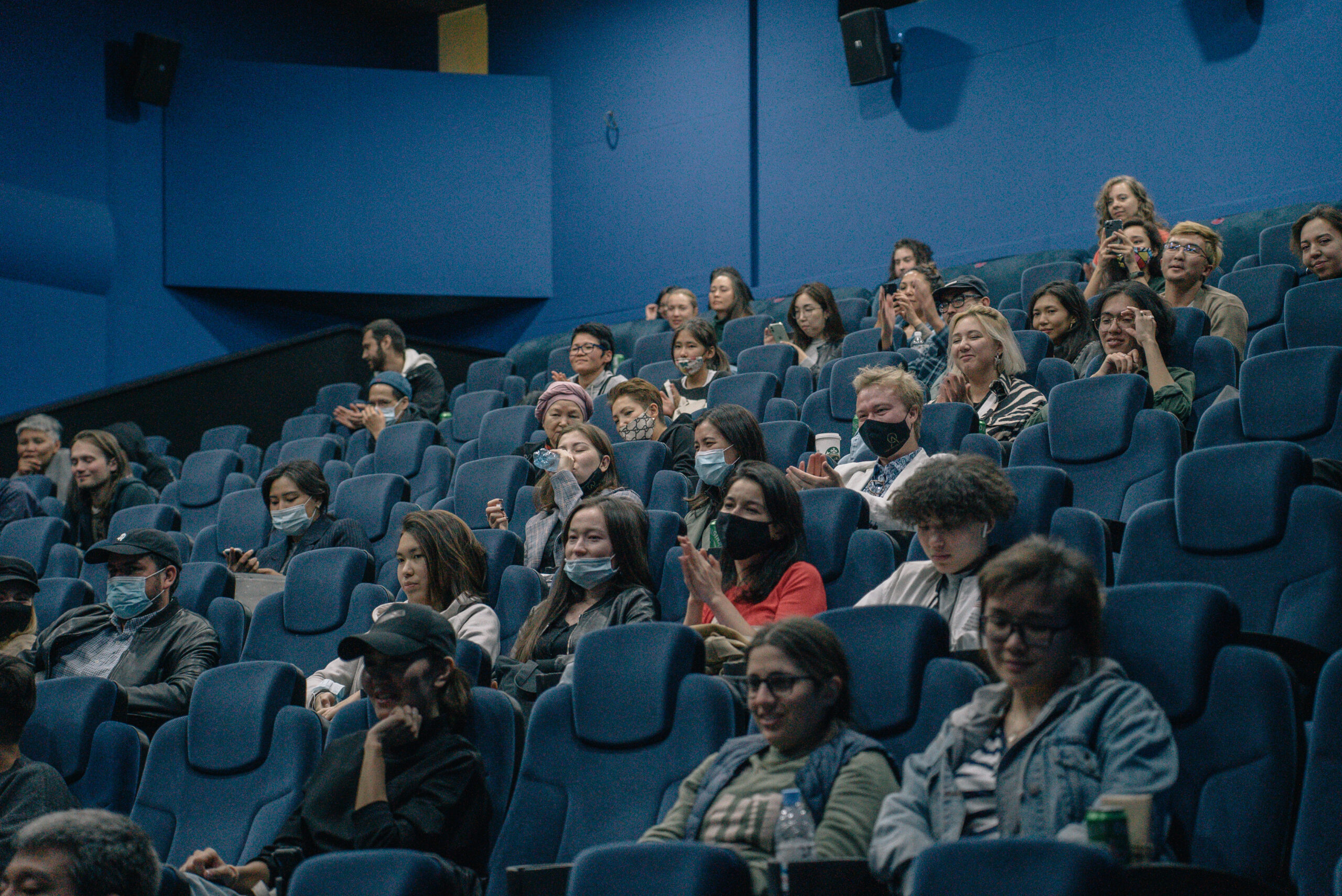ASTANA – Independent documentary film festival QaraFest is returning this year with a captivating selection of 11 international and eight Kazakh films on July 5-9 in Almaty. The festival’s founder, Ulyana Toporovskaya, spoke to The Astana Times about the festival, the peculiarities of non-fiction storytelling, and the prospects and challenges faced by the Kazakh documentary film industry.

In 2021, the festival gathered viewers both in online and offline formats. Photo credit: QaraFest press service
Centered on the theme of finding a home, this year the Qara (Look from Kazakh) Fest features 11 documentaries in various genres from Armenia, Denmark, Finland, France, Germany, Hungary, India, the Kyrgyz Republic, the Netherlands, Poland, Ukraine, Sweden and Tajikistan.
For the first time in the festival’s history, eight Kazakh features will be available as part of the Biz (We) short-film contest.
Concept of home
Toporovskaya said the theme was chosen to bring attention to the concept of home as a place where one seeks safety, a sense of belonging and explores one’s own identity and heritage.

Ulyana Toporovskaya. Photo courtesy of the author.
“The theme became clear after the program was already finalized,” said Toporovskaya. “Having looked at all of the films together, I felt that most of them explored the themes of either finding, building or rebuilding a home, whether that would be a physical place, or more like an internal feeling.”
Toporovskaya has an unconventional path to finding documentaries to be featured at the festival. “I’m kind of a film hunter myself,” she said.
“Even though we do call for submissions, the festival is, of course, not yet as pronounced worldwide, as many others, given that it’s only its third edition, so I look for films myself and contact authors that I might know and search for the best films at other festivals. Then it’s about determining which of the films are relevant for our Kazakh audiences,” she added.
Festival’s mission
The festival has two missions, according to the founder.
One is to connect to the hearts of the audience and provide them with a meaningful shared experience of watching authentic stories so that “they leave the theaters feeling that they’ve taken something valuable with them.”

In 2021, as Kazakhstan was easing the COVID-19 pandemic restrictions, the festival was able to organize both online and offline screenings. Photo credit: QaraFest press service
Another goal is to build a platform for local documentary filmmakers to support their projects, “for them to feel they have this platform here in Kazakhstan so they’re not just hoping for either an international or a YouTube release,” said Toporovskaya.
Promoting greater documentary genre representation through diverse film choices remains vital for Toporovskaya. The festival offers a wide range of films in style, perspective and tone.
“I make sure that the program is diverse enough to popularize documentary cinema in all its variety of genres. For instance, the opening film this year is actually an animated documentary. It uses animation specifically to tell a story anonymously. It really protects the subject while also being just a very beautiful and creative way of telling the story,” said Toporovskaya.

This year the festival opens with the Sundance Grand Jury Prize winner animated documentary “Flee” directed by Jonas Poher Rasmussen. Photo credit: screenshot from the film/qarafilmfest.kz
She also focuses on films that break certain taboos in Kazakh society. “For instance, some European films might not be breaking news for their society, but for ours, it could be really good to show them, even healing in some ways,” she said.
The inclusion of such documentaries has received a great deal of support from the audience in previous festivals.
“In 2020, in the first edition of the festival, we showed a film called ‘The Little Death’ which is about female sexuality as it explores the female orgasm. It’s a film that’s very tastefully made, it introduced abstract images, it’s very PG-13 visually [may be inappropriate to children under 13], but we had such positive feedback from the audiences and got many emails from all over Kazakhstan,” said Toporovskaya.
Kazakh documentary film industry and audience
The Kazakh documentary film industry is developing rapidly and showing promising signs of further growth.

The Kazakh audience is becoming more inquisitive about documentaries and engaging, according the founder. Photo credit: QaraFest press service
“We don’t have many feature documentary films released in Kazakhstan every year yet, but there’s lately definitely been a surge of new talents due to fiction filmmakers now also turning to the world of documentary cinema. There’s definitely been a growing sense of a community of filmmakers, experts, festival organizers and just documentary film lovers that has been created in the last one and a half years,” said Toporovskaya.
The Kazakh audience is also becoming more inquisitive about documentaries, she said.
“Our audience mostly consists of already quite curious, open-minded people who are interested in what’s going on around them. In terms of age, it’s mostly quite young people from 18 to 40 years of age. Based on our Instagram statistics, about 64% are women, which is very good,” said Toporovskaya.
Since the launch of the festival, the viewers’ attitude has shifted from simple curiosity to more intentional and thoughtful engagement.
“I definitely see that the perception of documentary cinema in Kazakhstan has been changing over the last years, in part due to our contribution, I hope. It’s now seen as something not only entertaining but something that you can use to learn about the world, and to engage with it more thoughtfully,” said Toporovskaya.
The rising curiosity among audiences also speaks of an increased interest in the lives of locals as well as the Central Asian region.
“What I noticed in the Qara Fest audience is that the most liked posts on Instagram are about local films or Central Asian films. So even though we show many international films, it’s very heartening and beautiful that the audience really welcomes our films and regional films as well,” she said.
“Both the filmmakers and the audience are waking up from the Soviet belief that we are small or we need to be quiet, and really exploring their identity, becoming curious about themselves. I feel like this is a big change that we are curious not only about the world but in ourselves,” she added.
The Kazakh filmmakers are captivating global audiences as well.
“Two projects that I can mention are Sasha Shegai’s ‘Acting Classes’ that just won the main prize of the Edinburgh Pitch. She’s participating in the Ex Oriente Film workshop which is a very selective European workshop and that’s her first project, which is a very significant achievement. In addition, ‘River Dreams’ by Kristina Mikhailova is participating in Docs by the Sea, Circle Women Doc Accelerator, and various other events,” said Toporovskaya.
“It’s great to see international interest in our local stories,” she added.
QaraFest debuts Biz short-film contest
This year’s festival brings to the spotlight local documentary filmmakers through the Biz, a short-film contest.
When deciding what to bring forward from dozens of films sent from all over Kazakhstan, it was important for Toporovskaya that they tell authentic local stories about people, capturing social themes.
A great example of this is “The Invisibles” by Vika Shegai, a film that explores the lives of the female elderly in Ekibastuz.
“It took a while to find those eight films, but I’m very happy with the selection. It’s actually very diverse both in terms of the stories and creative approaches, and the geography of the stories within Kazakhstan. So they’re not just based in Almaty or Astana, but also in Ekibastuz, Aral and other towns, cities and regions of Kazakhstan,” she said.
Challenges facing the Kazakh documentary industry
While local public support remains strong, there are certain challenges to overcome for the industry to flourish.
One of the challenges is a lack of clear funding routes for documentary films. “We lack independent institutions that have been working sustainably for a long time, which specifically fund culture and arts,” said Toporovskaya.
There are also not enough documentary specialists on the decision-making committee within the national film funding institutions.
“Last year there were 16 experts and none of them are documentary experts, but they’re making decisions on documentary funding. I don’t think this is ideal,” she said.
The industry also lacks professional documentary film producers, so a large number of filmmakers are compelled to carry out the whole project on their own. The hope is that the festival may help shine a spotlight on the industry challenges.
The festival’s plans
While those issues may suggest that there is still a lot of short-sightedness in the industry, the Qara Fest team has been upping the ante in the range of activities that they undertake in addition to the festival.
Over the past three years, the festival has been credited with launching the AÝT (Say) Central Asia documentary pitching project, where the winners received a cash prize and the opportunity to present their projects at major international pitching venues.
It also kicked off cultural and educational project Festiväl Dostary (Festival’s Friends), dedicated to training enthusiasts from Kazakhstan to independently organize screenings of documentary films of past Qara Fest releases for their own communities.
“We want to continue with AÝT Central Asia, Festiväl Dostary and Biz and to grow these projects,” said Toporovskaya. “And, of course, we want to make sure that the festival finally welcomes more international guests.”
This year the festival will welcome Anisa Sabiri, the UK-based Tajik filmmaker, with her “Rhythms of Lost Time” documentary. More internationally well-known filmmakers want to come to Kazakhstan, including Simon Lereng Wilmont, director of “A House Made of Splinters,” nominated for the Oscar this year.
“I met him in Prague when I was on the panel of judges for the Czech One World Film Festival. He really wanted to come to Kazakhstan to present the film and it would have been an incredible opportunity for local filmmakers if he, for instance, gave a masterclass here. But because Kazakhstan is far away, it is very expensive to bring filmmakers, so once again we face the issue of funding,” said Toporovskaya.
The festival is also uniquely placed to combine the work with the audiences and the work with the industry.
“QaraFest started out as very much an audience-oriented [festival], mostly to popularize documentary cinema. But now it’s leaning more towards the industry as well. In the end, it would connect the two, remaining an audience-focused festival with a stronger industry element,” she said.

